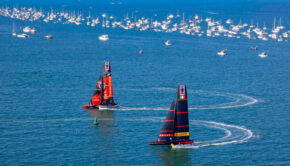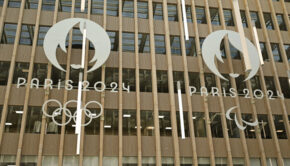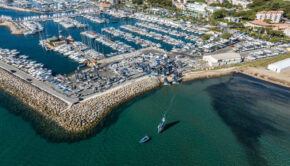Rio Mayor admits failure of clean-up commitment
Published on March 24th, 2015
At the end of a regatta, the winners are recognized. Like most sports, not everyone can win, but at the 2016 Olympic Games, everyone will the opportunity to get sick.
As reported in the Associated Press, with 500 days to go until the 2016 Olympics begin, Rio de Janeiro’s mayor acknowledged Monday (Mar 23) that the much-touted goal of cleaning up the city’s blighted waterways for the games would likely not be met.
In an interview with SporTV, Eduardo Paes said that cleaning up Guanabara Bay, the sewage- and trash-filled waterway where the Olympic sailing events are to be held, “is something that we should have been able to achieve.”
“It is indeed a wasted opportunity,” Paes said, adding, “as a Rio resident, I think it’s a shame.”
Without a well-developed sewage collection and treatment system or reliable garbage collection in the sprawling urban area that rings the bay, tons of garbage and raw sewage flow into the bay, as well as other area waterways — including Rio’s world famous beaches.
While the first government programs to clean up the bay date back more than 20 years, little progress was made, and in Rio’s Olympic bid authorities promised a massive cleanup effort that would be an enduring legacy of the games.
But as the games have drawn nearer with little evidence of progress and an often-changing plan for slashing the flow of raw sewage, state officials from the governor to the state’s top environmental official have voiced their skepticism that the Olympic promises could still be met. Paes added his voice to the chorus on the eve of the 500th day before the 2016 games kick off in Rio.
Athletes, too, have sounded the alarm bells about water conditions in Guanabara Bay, with many worried about falling ill from the spray of the sewage-filled water, as well as potential collisions with floating trash.
Olympic officials, however, have continued to insist that the promises would be met, and the brackish waters of the bay cleaned up for the games.
Still, Paes was careful to say the waters wouldn’t pose a risk to Olympic athletes, emphasizing that the Olympic events are to be held in the cleanest part of the bay.
But a helicopter ride Monday organized by biologist and environmental activist Mario Moscatelli illustrated the extent of the problem, revealing household trash floating throughout the entire bay, including within lanes for the Olympic sailing competition.
(Editor’s note: Only the ocean course is ‘sort of’ clean, but the sailing facilities are located within the polluted Bay. As several of the Olympic boats are not adequately sea-worthy, and as the waves on the ocean course can be quite big, some of the events may be held entirely within the Bay, and the Medal Races for all classes will be held in the Bay. As was famously admitted in August 2014 by Ricardo Prado, who heads the Sport Advisory Committee for Rio 2016, “I guess when we say yes, we don’t always really mean yes.” Nice!)
Heavy rains in Rio over the weekend exacerbated the problem. Each time the tropical city sees heavy rains, the amount of raw sewage emanating from the city’s more than 1,000 “favela” slums spikes and huge amounts of trash are flushed off the streets and into area waterways.
Canals on Monday were overflowing with sewage, their murky waters staining the sapphire blue waters of the Atlantic ocean off the the golden sands of a popular beach in the Barra de Tijuca neighborhood, one of the main Olympic hubs.
Source: Associated Press
More: Chinese news source Xinhua reported that Rio de Janeiro’s mayor Eduardo Paes also said the city has a contingency plan to ensure Guanabara Bay is clean for the 2016 Olympics. “As a last resort we will have a contingency plan whereby people will collect solid waste so that the Olympics are not affected.”









 We’ll keep your information safe.
We’ll keep your information safe.